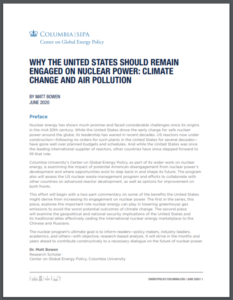Full Title: Why the United States Should Remain Engaged on Nuclear Power: Climate Change and Air Pollution
Author(s): Matt Bowen
Publisher(s): Columbia University Center on Global Energy Policy
Publication Date: June 11, 2020
Full Text: Download Resource
Description (excerpt):
Nuclear energy has shown much promise and faced considerable challenges since its origins in the mid-20th century. While the United States drove the early charge for safe nuclear power around the globe, its leadership has waned in recent decades. US reactors now under construction—following no orders for such plants in the United States for several decades—have gone well over planned budgets and schedules. And while the United States was once the leading international supplier of reactors, other countries have since stepped forward to fill that role.
Columbia University’s Center on Global Energy Policy, as part of its wider work on nuclear energy, is examining the impact of potential American disengagement from nuclear power’s development and where opportunities exist to step back in and shape its future. The program also will assess the US nuclear waste management program and efforts to collaborate with other countries on advanced reactor development, as well as options for improvement on both fronts.
This effort will begin with a two-part commentary on some of the benefits the United States might derive from increasing its engagement on nuclear power. The first in the series, this piece, explores the important role nuclear energy can play in lowering greenhouse gas emissions to avoid the worst potential outcomes of climate change. The second piece will examine the geopolitical and national security implications of the United States and its traditional allies effectively ceding the international nuclear energy marketplace to the Chinese and Russians.
The nuclear program’s ultimate goal is to inform readers—policy makers, industry leaders, academics, and others—with objective, research-based analysis. It will strive in the months and years ahead to contribute constructively to a necessary dialogue on the future of nuclear power.
